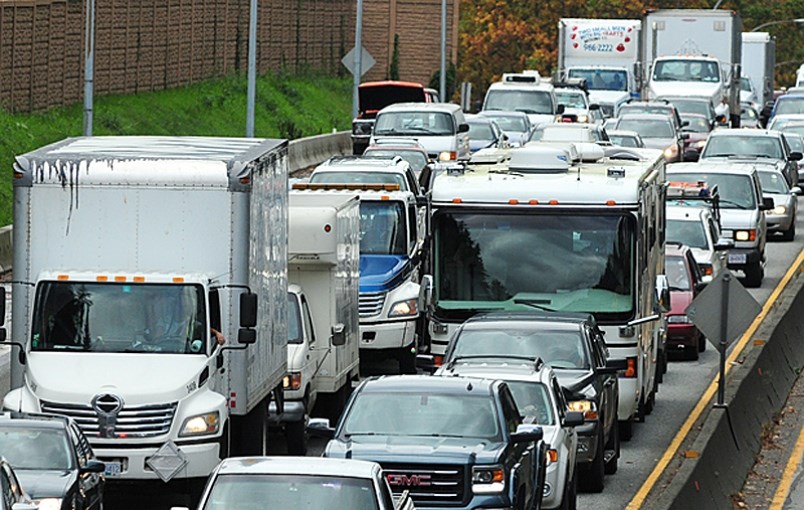Trying to get more people out of their cars during gridlocked rush hour on the North Shore is a laudable goal. But doing that when reasonable transit options aren’t available and charging those who can least afford it more to drive aren’t good options either.
Those were among the dilemmas that a handful of North Shore stakeholders grappled with recently as they sat down to discuss ideas for road, vehicle or congestion tolls being considered by a mobility pricing commission.
The session held at North Vancouver’s Holiday Inn Nov. 8 was one of several invitation-only discussions with stakeholders being held throughout the Lower Mainland as the commission gathers information that will go into a final report and recommendations next spring.
All of those gathered agreed that traffic congestion is a big problem on the North Shore, but didn’t see easy answers on what to do about it.
“There are a lot of people who want to make changes to help this … they are not provided with solutions,” said Sylvain Celaire of Modo car sharing. A lack of dedicated bus lanes means buses also frequently get stuck in gridlock, said Alison Morse, representing ferry travellers from Bowen Island.
Stakeholders also pointed to a lack of buses that cross the entire North Shore and a lack of park-and-ride lots that would make taking transit partway to destinations more feasible for many people.
Transportation patterns are being driven by a lack of affordable housing, which also impacts businesses trying to hire staff, said Carol Reimer of North Vancouver’s integrated transportation committee. “Whenever I think of this topic I think about the poor folks who are moving out (of the North Shore) to have a family,” said Reimer.
Morse added if the committee considers taxing larger vehicles as a way to encourage smaller, fuel-efficient choices and cut down on pollution, it will end up penalizing families.
“You’ve got the family who can only afford one car. They’ve got the dog and four kids. They’re not going to be in the Smart car,” she said.
Most of those gathered agreed people with lower incomes and less flexible work schedules could end up getting hit harder with any mobility pricing unless there are good alternatives.
“Being poor is extremely expensive and time-consuming,” said Celaire.
North Shore residents are among those spending the most time stuck in traffic in Metro Vancouver and are feeling the most frustrated about its impact on their lives, according to another study done by the Mobility Pricing Independent Commission.
About 30 per cent of the time people spend driving in rush hour in the Lower Mainland is spent sitting in traffic snarls, according to the commission’s preliminary research.
North Shore drivers are among the worst affected, along with residents of Langley, the study found.
The public can register their thoughts about what to do about traffic gridlock by logging on to the commission’s website at itstimemv.ca.
Early online results (which change as more people respond to the survey) showed that more than 70 per cent of those answering said congestion makes travel to and from the North Shore difficult. More than 85 per cent of respondents rated improvements to transit as an important goal, while 67 per cent pointed to the need to improve roads and transportation infrastructure. About 67 per cent said it should cost less to drive in areas with fewer transit options.



